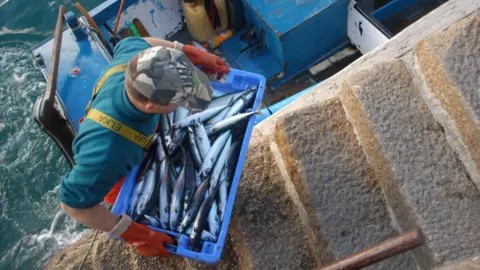Like octopus, the UK-EU deal is a mixed blessing
 BBC
BBCThe population spike in the Mediterranean common octopus is a mixed blessing.
Bad news if you want to catch crab or lobster, and doubly bad news if the octopus eats your crab or lobster and then escapes so you do not get to land an octopus either.
And octopus is valuable catch in its own right - a fishmonger once told me a story about a crab boat which returned to port with pots full of octopus which had eaten all the captive crabs.
The octopus earned the crabber almost twice as much as the crabs would have done.
'Used and abused'
But the lucrative market for the octopus - like most of our native fish and shellfish - lies across the Channel in continental Europe.
The UK-EU deal is another mixed blessing for the South West.
For the UK catching sector - the people who risk life and limb going to sea - it's another huge disappointment, if hardly a surprise.
Leave campaigners during the EU referendum campaign talked up a bright future for the industry outside the bloc.
The Brexit deal struck by Boris Johnson's government in 2020 did return some fish quota to the UK - though the main beneficiary was the pelagic fleet in Scotland.
Its great failing in the eyes of the industry was its failure to exclude EU boats from the UK's six to twelve-mile (10 to 19km) inshore waters.
The Cornish Fish Producers' Organisation said the industry had been "used and abused".
Inshore waters access
The Johnson government suggested a better outcome could be brokered when the deal came up for review in 2026.
Now we have reached that point and the present government has agreed to foreign access in inshore waters continuing for at least another 12 years.
The plans to remove regulatory barriers for exports are - so to speak - another kettle of fish entirely.
Before we left the European Single Market, selling fish to France was a simple as selling it within the UK.
After we left - and under the terms of the Johnson deal - a raft of complicated and costly regulation engulfed exports to the EU.
Many businesses warned they were struggling to cope with something which had previously been so simple.
Some say they have since seen huge cuts to their trade. The especially unlucky ones have gone under - blaming Brexit and its aftermath.
The rules in question apply not just to fish but to food exports more generally.
Sweeping them away could allow many business to recover and expand - and, in some cases - stay in business in the first place.
Follow BBC Cornwall on X, Facebook and Instagram. Follow BBC Devon on X, Facebook and Instagram. Send your story ideas to [email protected].
